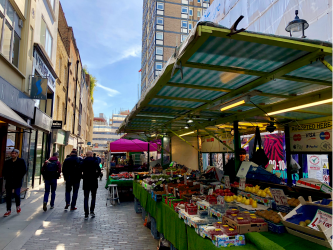
Eternal gratitude is what I feel when my excellent ear training for the musicality of the spoken word is needed. Whatever the situation. It goes back to the time I was at London University’s Institute of Education, studying for the Postgraduate Certificate in Music Education, just specifically introduced for Music two years earlier. It would have been 1960 or thereabouts.
Doris Gould was a tutor and drawing on her work as a very entertaining and gloriously informed BBC broadcaster to schools, she taught us everything we would need to know about classroom singing. One of her many tricks I never forgot. She showed us how to hear our own voice as other people hear it: cup your open hands and speak into them so that the sounds are projected backwards toward your ears, in the way they do toward external persons. Get over the shock if you are doing this for the first time!
(Laurence Olivier once told me that I should take great care of my voice. He said it would make a small fortune for me if I did. I had no idea what he was talking about. This was before Doris had taught me how to hear my own voice. And besides, when Larry said this, we had both drunk more champagne than was good for us. And in sobriety and even in relative poverty, I have never had the courage to explore that presumed prospect further.)
Doris was a master communicator. She had lots of other tips on this subject and positively oozed with generosity in all she gave. (Another excellent tutor was Gertrude Collins who let us into the secrets of class string playing – especially for the violin. All of us – violinists and non – became exactly that: violinists. But don’t listen to any of us too closely. Gertrude kept a double bass in her room and all students had to make an appointment to show her we knew how to tune it. Along with that came a glass of whisky which she kept in her desk’s bottom drawer!)
I have always had a fascination with Cockney speech. To my ear it’s hypnotic. Sadly, it is becoming rarer. But at Berwick Street market in Soho it is alive and well. Though the market is now reduced to a mere seven or so stalls, the ‘barrow boys’ who are left do not disappoint in their verbal communications. I am proud to have been a signature on a petition to Westminster Council, calling upon them to please not close the market (which the Council claimed it wanted for ‘development’. For which, please read for super-wealthy foreign speculators of untraceable provenance). My visits to Soho are frequent for professional music and theatre reasons. And now, to also do my duty by those Berwick Street barrow boys.
Just a couple of days ago I was on a bus when two youngish men got on and began to sing. Lustily. And in unmistakable Cockney. It was around 4pm. Were they drunk? Had they been drinking? I am unable to answer these questions. I am only too aware that in moments of joy, Cockneys can sound drunk even when they are not. In a word, lust can be naturally woven into the fabric of their communication.
O Doris Gould thou shouldst have been living at this hour! Let me try to reproduce phonetically what they sang:
Aranchis un limmuns
Soyd the bawls o’ Sunt Climmentz.
Wen wi’ yer poy mi?
Sid the bawls o’ Ol’ Boylee?
Wen oy gore rish
Sid de bawls o’ Shawrdeetch.
I wanted to join in. But just as I was readying my voice for this ‘non-invitation’ the young men got off the bus. A pity. The rest of the bus in the lower deck where this was, had been glum until now. But the lusty singing had brought smiles to their faces. And if I had been quicker off the mark, the young men might have even stayed with us. Unexpectedly self-congratulatory, courtesy of their uninvited ‘audience’.
Now try this. Altogether now! The key is F minor (at least in The National Songbook) and appropriate for a pandemic (tempo – lento ma con moto [slowly but keep it moving]):
There was a jolly miller once
Lived on the river Dee.
All day he sang from morn till night,
No lark more blithe than he.
And this the burden of his song
Forever used to be:
I care for nobody, no not I,
If nobody cares for me.
This song is in F minor, but the final chord is (shockingly!) in F major – in what is called a Tierce de Picardie (Picardy cadence [TdP]). The songster removes the miller from his sorrows. He was after all a ‘jolly miller’. From all versions of the song I only give the first verse (above) where the last two lines become a ritornello (chorus) to the other three verses. All versions can be traced back to Isaac Bickerstaffe’s 1762 play Love in a Village.
The said miller is presumed to have owned the mill on the River Dee near Chester. However, long before Bickerstaffe, Henry VIII had claimed ownership on the grounds that the mill was on the King’s land. And news of the miller’s hard work, accumulated riches and guile had reached London.
In such circumstances, a TdP would have been presumptuous coming from the miller. The TdP was a common enough device, liberally used by such seventeenth century-born composers like both Alessandro, and son, Domenico, Scarlatti, J.S. Bach, and Handel. (The last three all born in 1685.) In our own times Roger Quilter made an arrangement of it, as did Benjamin Britten for his partner, Peter Pears. This last arrangement gets my own best vote. Hear it on YouTube from a live recording at Aldeburgh on 22 September 1972 with Britten at the piano.
And sing your way through to the other side of the pandemic! Lots of other songs too.
Jack Buckley
